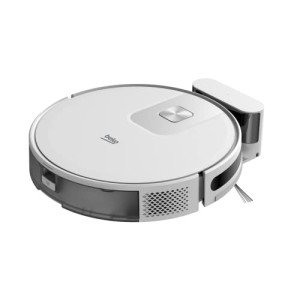The Rise of Robot Cleaners in Commercial Spaces
Intro
In the last few years, developments in technology have generated automation in various sectors, including whatever from making to client service. One noteworthy advancement in this arena is the introduction of robot cleaners in commercial areas. These automated cleaning makers have transformed the method companies approach tidiness and maintenance, providing an option that is not only effective but likewise cost-efficient. As Robot Vacuum Cleaner Best Buy seek to improve their functional effectiveness while maintaining high standards of health, robot cleaners have become an important part of modern commercial environments.
Comprehending Robot Cleaners
Robot cleaners are autonomous devices geared up with sensing units, video cameras, and expert system that permit them to browse and clean numerous surfaces without human intervention. They can be found in different types and performances, accommodating diverse commercial needs. Here's an introduction of the main types of robot cleaners:
- Autonomous Vacuum Cleaners: These gadgets are created for efficiently vacuuming floorings, particularly in environments such as workplaces, retail spaces, and storage facilities.
- Scrubbing Robots: These robots are tailored for hard surfaces, employing scrubbing and cleaning services to tackle difficult discolorations and gunk.
- Disinfection Robots: Equipped with UV-C light or chemical sprayers, these robots concentrate on sanitizing locations, considerably reducing the existence of harmful bacteria and viruses.
Table 1: Types of Robot Cleaners and Their Features
| Type of Robot Cleaner | Primary Function | Ideal Environment | Secret Features |
|---|---|---|---|
| Autonomous Vacuum Cleaner | Floor vacuuming | Offices, Retail Spaces | Sensors for navigating challenges, scheduling |
| Scrubbing Robot | Tough surface area cleaning | Warehouses, Hospitals | Dual-brush system, adjustable settings |
| Disinfection Robot | Surface area disinfection | Healthcare settings | UV-C or electrostatic spraying technology |
Advantages of Using Robot Cleaners in Commercial Spaces
The integration of robot cleaners in commercial environments offers a myriad of benefits:
Increased Efficiency
Robot cleaners run autonomously, permitting them to clean areas at any time of the day or night without the need for human supervision. This performance is especially helpful for large centers that experience high foot traffic, as these robots can cover more ground in less time.
Consistent Cleaning Quality
Robot cleaners are developed to perform consistently, running on pre-programmed settings tailored to the specific needs of the environment. This makes sure a trustworthy standard of cleanliness throughout the facility.
Cost-Effectiveness
While the initial investment in robot cleaners might be substantial, the long-term savings can be substantial. Robot cleaners reduce the requirement for a large cleaning personnel, minimize human mistakes, and can decrease expenses related to cleaning materials.
Enhanced Safety
In settings like health centers and labs, preserving health is crucial. Robot cleaners reduce human contact with potentially dangerous products or areas, therefore enhancing overall safety.
Eco-Friendliness
Lots of modern robot cleaners are designed with sustainability in mind. They efficiently use water and cleaning products, often geared up with settings that decrease waste. This adds to a greener approach to cleaning in commercial spaces.
Key Considerations Before Implementation
While the advantages are substantial, businesses need to consider numerous elements before investing in robot cleaners:
- Space Design: The design of the center can affect a robot's effectiveness. Areas with numerous barriers may require advanced models equipped with advanced navigation systems.
- Maintenance: Although robot cleaners are normally low-maintenance, they do require routine checks to guarantee ideal performance. Having a dedicated specialist or service agreement might be necessary.
- Software Updates: The technology behind robot cleaners progresses rapidly. Keeping the software application up to date is vital for keeping performance and security.
- Combination with Current Systems: Understanding how robot cleaners can be incorporated into existing cleaning procedures is essential to optimizing their prospective advantages.
Case Studies: Successful Implementation of Robot Cleaners
Case Study 1: A Large Retail Chain
A large retail chain executed self-governing vacuum across its various stores. The robots permitted cleaning to occur throughout hours of operation, which significantly reduced labor expenses and enhanced total shop tidiness. The chain reported a 25% boost in customer satisfaction, straight attributing it to the enhanced shopping environment.
Case Study 2: A Local Hospital
A healthcare facility released disinfection robots to take on extensive cleaning regimens, especially in waiting locations and operating spaces. These robots successfully alleviated infection risks while allowing cleaning staff to concentrate on other pressing tasks. The medical facility kept in mind a significant decline in post-surgical infection rates, validating the effectiveness of robotic disinfection.
FAQs About Robot Cleaners in Commercial Spaces
Q1: Are robot cleaners appropriate for all commercial environments?
- A: While robot cleaners are versatile, their viability might differ based on area design and cleaning requirements. It is vital to assess the particular requirements and design of your commercial area.
Q2: How much do robot cleaners cost?
- A: The price of robot cleaners can vary commonly based on their features and abilities. Standard designs might begin at ₤ 1,000, while innovative models can cost upwards of ₤ 10,000.
Q3: How frequently do robot cleaners require upkeep?
- A: Robot cleaners normally require minimal maintenance. Routine checks and software application updates are suggested, while parts like filters may require changing based upon usage.
Q4: Can robot cleaners work along with human personnel?
- A: Yes, robot cleaners are created to match human personnel instead of replace them. They can take over regular cleaning tasks, permitting personnel to concentrate on more complex tasks.
The commercial cleaning landscape is experiencing a substantial change through using robot cleaners. These gadgets match human effort, enhance tidiness, and add to cost savings, making them a deserving investment for companies wanting to improve their operational performance. As technology continues to progress, the abilities of robot cleaners are most likely to broaden, further solidifying their role in maintaining tidiness in commercial spaces. With cautious factor to consider of private requirements and an ingenious approach, businesses can welcome this technology to develop a cleaner, more secure, and more efficient workplace.

